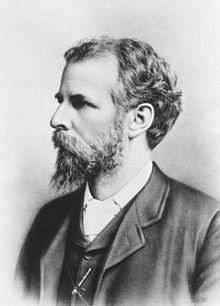James Sully | |
|---|---|
 Sully in about 1880 | |
| Born | 3 March 1842 Bridgwater, Somerset, England |
| Died | 1 November 1923 (aged 81) Richmond, Surrey, England |
| Occupation | Psychologist |
| Nationality | British |
| Literary movement | Associationism |
James Sully (3 March 1842 – 1 November 1923)[1] was an English psychologist.
Biography
He was born at Bridgwater, Somerset the son of J. W. Sully, a liberal Baptist merchant and ship-owner.[2] He was educated at the Independent College in Taunton, Regent's Park College, at the University of Göttingen, where he studied under Lotze, and at Humboldt University, Berlin where he studied under Emil du Bois-Reymond and Hermann von Helmholtz.[3]
Sully was originally destined for the nonconformist ministry and in 1869 became classical tutor at the Baptist College, Pontypool.[4] In 1871, however, he adopted a literary and philosophic career. Between 1892 and 1903, he was Grote Professor of the Philosophy of Mind and Logic at University College London, where he was succeeded by Carveth Read.[5]
An adherent of the associationist school of psychology, his views had great affinity with those of Alexander Bain. He wrote monographs on subjects such as pessimism, and psychology textbooks, some of the first in English, including The Human Mind (1892).[5] His 1881 Illusions was commended by both Freud and Wundt.[3]
Sully opened an experimental psychology laboratory at University College London in January 1898. In 1901 he was one of the founder members of the British Psychological Society and in fact personally called the meeting at which the Society was formed.[6]
Sully died in Richmond, Surrey on 1 November 1923.[7]
Works
Books
- Sensation and Intuition (1874)
- Pessimism (1877)
- Illusions (1881; 4th ed., 1895)
- Outlines of Psychology (1884; many editions)
- Teacher's Handbook of Psychology (1886)
- Studies of Childhood (1896)
- Children's Ways (1897)
- An Essay on Laughter (1902)
- Italian Travel Sketches (1912)
- My Life and Friends (1918)
Selected articles
- "The Æsthetics of Human Character", in: The Fortnightly Review, Vol. XV, 1871.
- "Aesthetics", in: Encyclopædia Britannica, 9th edition, 1875–1889; republished online at 1902encyclopedia.com. Retrieved 17 April 2017.
Notes
- ^ "Comings and Goings in the History of Psychology". gator.uhd.edu.
- ^ "Oxford Index".
- ^ a b Elizabeth Valentine "James Sully". The Psychologist, Vol 14, No 8, 2001, p. 405
- ^ Gurjeva 2004.
- ^ a b Chisholm 1911.
- ^ Geoff Bunn "Founding Factors". The Psychologist, Vol 14, No 8, 2001, pp. 404–405
- ^ Gurjeva, Lyubov (September 12, 2006). Grayling, A.C; Goulder, Naomi; Pyle, Andrew (eds.). The Continuum Encyclopedia of British Philosophy. Continuum. doi:10.1093/acref/9780199754694.001.0001. hdl:11693/51028. ISBN 9780199754694 – via www.oxfordreference.com.
References
- Gurjeva, Lyubov G. (2004). "Sully, James (1842–1923)". Oxford Dictionary of National Biography (online ed.). Oxford University Press. doi:10.1093/ref:odnb/38636. (Subscription or UK public library membership required.)
Attribution
 This article incorporates text from a publication now in the public domain: Chisholm, Hugh, ed. (1911). "Sully, James". Encyclopædia Britannica. 26 (11th ed.). Cambridge University Press.
This article incorporates text from a publication now in the public domain: Chisholm, Hugh, ed. (1911). "Sully, James". Encyclopædia Britannica. 26 (11th ed.). Cambridge University Press.
External links
- Works by James Sully at Project Gutenberg
- Works by or about James Sully at Internet Archive
- "James Sully (1842–1923)" at History of Psychology Centre, bps.org.uk
- James Sully by Elizabeth R. Valentine (2001)